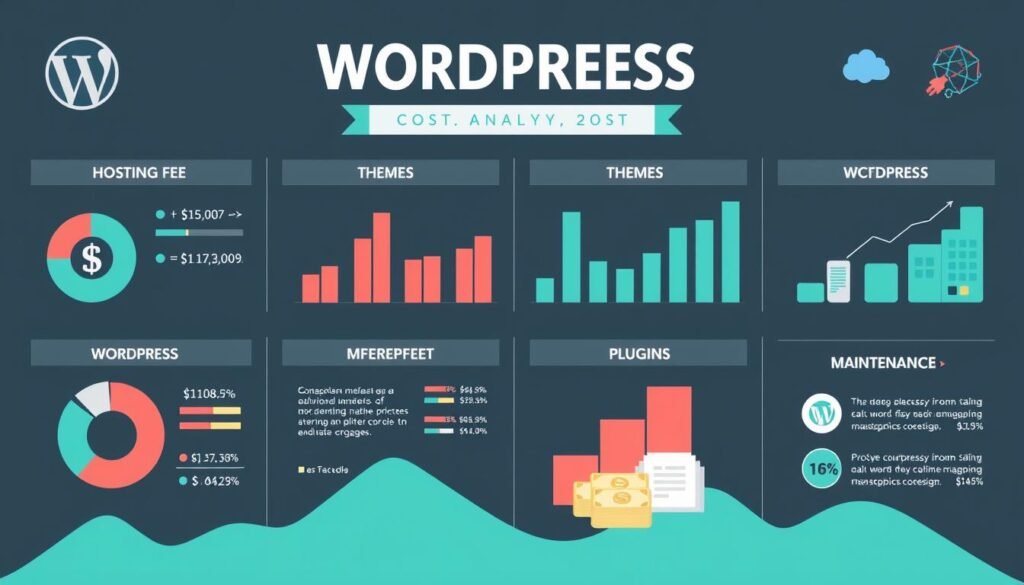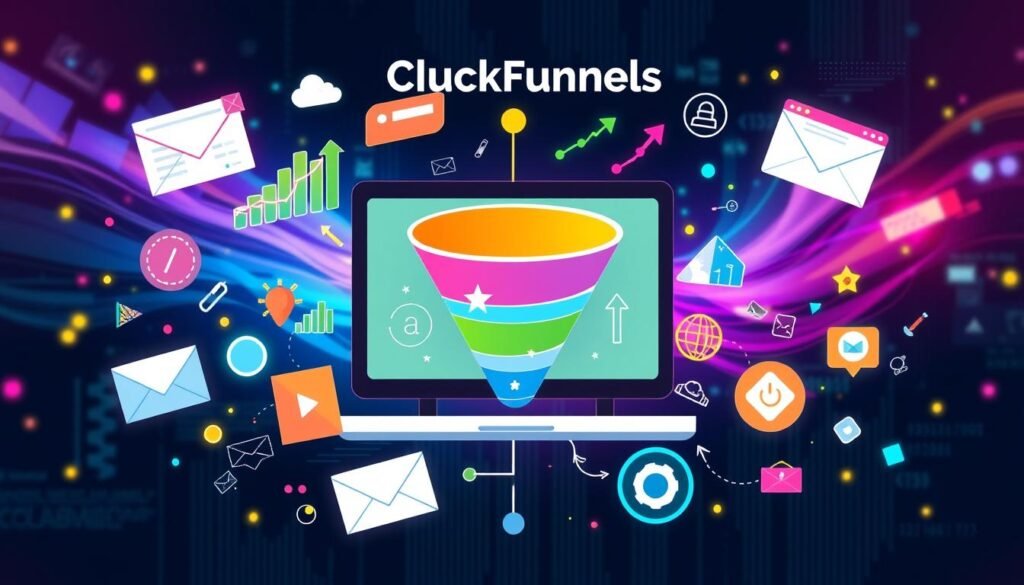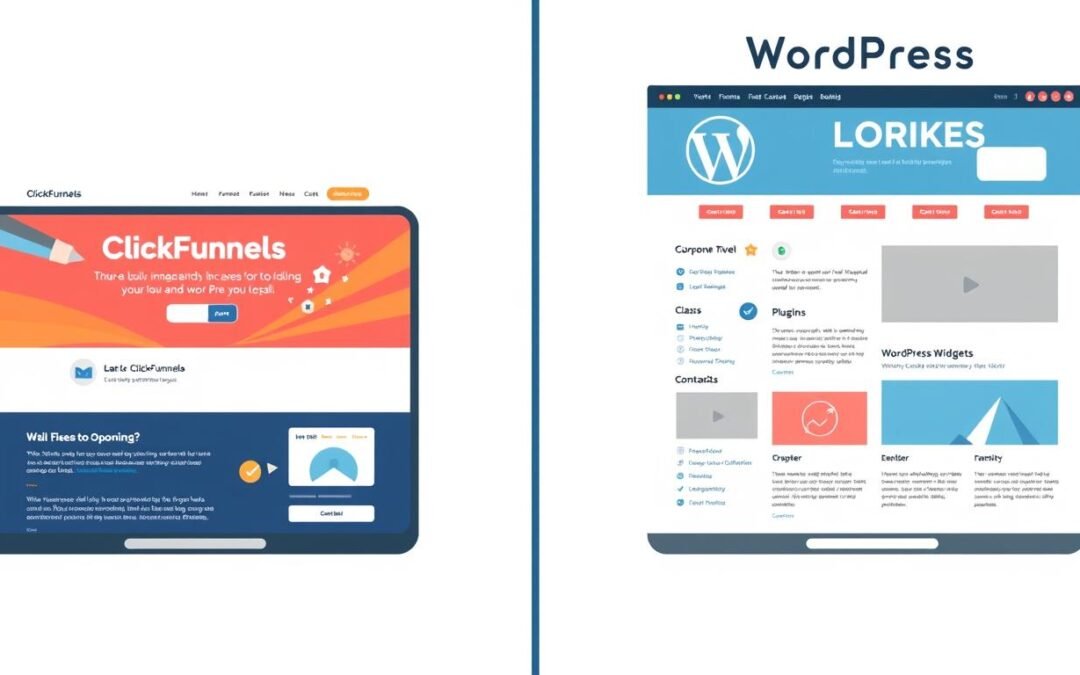In today’s digital world, having a strong online presence is key for businesses. They need to boost their digital marketing efforts. This article compares two top website building platforms: ClickFunnels and WordPress.
ClickFunnels helps businesses focus on making more sales with sales funnels. WordPress, on the other hand, offers lots of flexibility and customization for different websites.
When choosing, it’s important to know the features, prices, and user experiences of both. This guide aims to help you make the best choice for your website.
Understanding ClickFunnels
ClickFunnels is a powerful tool for marketers and entrepreneurs. It makes the customer journey easier. This marketing platform helps turn leads into customers with its easy design and features.
The ClickFunnels overview shows its drag-and-drop editor. It lets users create custom funnels easily, without needing tech skills. There are also pre-designed templates to get started fast, saving time and effort.
ClickFunnels also has strong email marketing tools. Users can manage contacts and send targeted campaigns. It has a CRM to keep all customer info in one place, helping build stronger relationships.
It’s great for selling products and services too. The platform has A/B testing and analytics to improve funnels and track results.
Overall, ClickFunnels is a top choice for sales funnel building. It has all the tools needed in one place. It’s perfect for those aiming for high conversion rates and better marketing.
Understanding WordPress
WordPress is the most popular Content Management System (CMS) worldwide, powering over 43.5% of all websites. It’s flexible, making it great for personal blogs, business sites, and online stores. Users love the many options it offers.
WordPress has two main versions: WordPress.org and WordPress.com. WordPress.org lets users control their sites fully. They can customize with CSS, PHP, and over 50,000 free plugins. WordPress.com, on the other hand, offers a managed experience but limits customization.
The WordPress community is huge, with lots of tutorials and forums for help. This community helps improve the platform. Users can pick from thousands of themes, both free and premium, to design their sites.
Costs are a big factor for users. WordPress is free, but hosting, domain registration, and premium themes or plugins cost money. A small-business website can cost between $2,000 and $9,000, with upkeep around $400 to $1,200 a year. For a simple sales funnel, WordPress can be under $250 a year.
WordPress is great for all skill levels. It has a learning curve for beginners, but it’s worth it for a strong online presence.
Overview of Key Features
The key features comparison between ClickFunnels and WordPress shows big differences. ClickFunnels is great for sales funnels and marketing tools. It’s perfect for entrepreneurs and small businesses wanting to boost sales.
ClickFunnels has a drag-and-drop builder, pre-made templates, payment options, and A/B testing. On the other hand, WordPress offers many plugins and themes for different websites, including online stores. It’s good for bloggers, content creators, and developers because of its customization and support.
| Feature | ClickFunnels | WordPress |
|---|---|---|
| Core Functionality | Sales funnels and marketing automation | Content management and website versatility |
| Customization | Limited to funnel design | Highly customizable with themes and plugins |
| Pricing Model | Subscription, starting at $147/month | Free, with additional costs for hosting and premium features |
| Ease of Use | Drag-and-drop interface for quick setup | User-friendly but requires some learning for customization |
| eCommerce Features | Built-in shopping cart and payment integrations | Plugins like WooCommerce for eCommerce functionality |
| Analytics & Tracking | Funnel analytics and conversion optimization tools | Marketing and SEO plugins for analytics |
Both platforms have their strengths. ClickFunnels is all about making sales easier. WordPress, on the other hand, is all about customization and flexibility for many types of websites.
ClickFunnels vs WordPress: Pricing Comparison
Pricing is key when deciding between ClickFunnels and WordPress. Knowing the ClickFunnels pricing and WordPress pricing helps users make smart choices.
ClickFunnels has three plans for different needs. The Basic plan starts at $147 a month, perfect for those who want to make sales funnels. The Pro plan is $197 monthly, with more features. The Funnel Hacker plan is $297 a month, for those who need lots of marketing tools.
WordPress is free to use. You might pay for domain and hosting, which cost $5 to $20 a month. This makes WordPress a good choice for many, with costs that can vary. You might also spend on premium themes or plugins, but it’s often cheaper than ClickFunnels.
Both platforms offer free trials or free versions with some limits. ClickFunnels has live chat and email support. WordPress relies on a big community for help, with lots of forums, tutorials, and guides.
The table below shows the main pricing details:
| Platform | Monthly Cost | Key Features |
|---|---|---|
| ClickFunnels Basic | $147 | Essential funnel building tools |
| ClickFunnels Pro | $197 | Advanced features for marketing |
| ClickFunnels Funnel Hacker | $297 | All premium tools and features |
| WordPress | Free + Hosting ($5-$20) | Flexible themes, plugins, and community support |
Looking at the pricing of ClickFunnels and WordPress helps figure out which is best for you.
How Much Does ClickFunnels Cost?
Understanding ClickFunnels cost means looking at its pricing tiers. The Basic plan costs $147 a month. It’s great for beginners, allowing up to 20 funnels and 10,000 contacts.
The Pro plan is $197 a month. It offers more tools for those wanting to boost their marketing. The Funnel Hacker plan, at $297 a month, is for advanced users aiming to maximize their sales funnel.
ClickFunnels uses a subscription model. This might seem expensive, but it’s worth it for those serious about boosting conversions. New users can try it for 14 days free to see if it fits their business goals.
For those looking at other options, WPFunnels is a cheaper alternative. The price difference in sales funnel pricing can sway decisions, balancing cost with functionality.
| Plan | Price (Monthly) | Funnels Allowed | Contacts Allowed |
|---|---|---|---|
| Basic | $147 | Up to 20 | Up to 10,000 |
| Pro | $197 | Unlimited | Up to 25,000 |
| Funnel Hacker | $297 | Unlimited | Up to 50,000 |
How Much Does WordPress Cost?
The WordPress cost varies a lot based on what you need. Starting out can be very affordable. You might pay about $20 a year for a domain and $5 to $75 monthly for hosting. This lets you find a price that fits your budget.
When you compare WordPress.org to WordPress.com, remember that WordPress.com pricing might include extra features. These aren’t available on the free version of WordPress.org.
Small businesses need a professional website, which can cost between $2,000 and $9,000. You’ll also need to budget for annual maintenance, which can be $400 to $1,200. Starting a sales funnel with WordPress can be very cheap, with yearly costs under $250 and one-time fees under $300.
Compared to ClickFunnels, which starts at $147 a month, WordPress is more affordable. ClickFunnels’ Basic plan costs about $1,524 a year. WordPress is a great choice for those looking to save money. It has over 50,000 free plugins and thousands of free themes. You can also find premium themes like Divi for unique designs.

ClickFunnels vs WordPress: Ease of Use
When we look at ClickFunnels and WordPress, we see they serve different needs. ClickFunnels usability shines because it’s easy to use, even for those not tech-savvy. It has a drag-and-drop builder that makes creating sales funnels simple.
WordPress usability is great for those who know web design. It’s used by over 43.2% of websites and is a top choice for content management. But, it can be hard for beginners to learn. Plugins like Elementor can make it easier, but it’s not as straightforward as ClickFunnels.
Let’s compare how easy it is to use both platforms:
| Feature | ClickFunnels | WordPress |
|---|---|---|
| User Interface | Intuitive, designed for ease | Flexible, requires some learning |
| Customization | Drag-and-drop editor with templates | Plugins like Elementor for customization |
| Community Support | Growing user base, resources available | Large community with extensive resources |
| Learning Resources | Guided tutorials and video support | Documentation and forums for troubleshooting |
| Target User Base | Entrepreneurs and marketers | Developers, bloggers, and businesses |
Both platforms have their own strengths. ClickFunnels is perfect for those who want to make marketing easy. On the other hand, WordPress is ideal for those who need more control and customization.
ClickFunnels User Experience
Marketers need to understand ClickFunnels to improve their sales process. It makes building sales funnels easy with a drag-and-drop interface. You don’t need to know how to code.
ClickFunnels offers many customizable templates for different business needs. You can use them for online stores or promoting services.
Customers say ClickFunnels loads pages fast, beating its competitors. A one-second speed boost can cut bounce rates by 32%. This shows how important speed is for keeping users.
ClickFunnels also has features for team work and CRM funnels. This lets users work together on funnels, making content creation faster. It also has email marketing tools to help automate follow-ups and create engaging campaigns.
In the end, ClickFunnels makes the sales funnel process easier. It’s great for those who want to boost conversion rates without dealing with website creation’s technical side.
WordPress User Experience
WordPress offers a mix of flexibility and strong features. At first, it can feel overwhelming with so many options. But, once you get used to it, the interface evaluation shows it’s easy to use.
What makes WordPress great is its community support. It has a huge user base that helps with lots of resources. Forums, tutorials, and guides are there to help you out. This community makes solving problems easier and faster.
WordPress is best for those who are eager to learn. Using the available resources makes it easier to get started. It’s rewarding for those who take the time to learn.

| Aspect | WordPress | ClickFunnels |
|---|---|---|
| User Interface | Flexible and customizable | Visual editor for funnels |
| Learning Curve | Requires time for mastery | Less technical knowledge needed |
| Community Support | Extensive tutorials and forums | Limited community resources |
| Customization Options | Thousands of themes/plugins | Built-in tools for funnel building |
| Long-term Usability | Cost-effective after initial setup | Higher ongoing monthly costs |
Customization Options in ClickFunnels
ClickFunnels lets users make unique sales funnels that fit their needs. They can pick from many design templates to match their brand. The drag-and-drop tool makes it easy for beginners to use.
Here are some key points about ClickFunnels customization:
- Design Templates: ClickFunnels has pre-made templates for professional-looking funnels, no coding needed.
- Funnel Flexibility: Users can change colors, fonts, and images to match their brand.
- A/B Testing: A built-in feature for testing different funnel versions to boost conversion rates.
- Payment Integration: Users can add payment options like PayPal and Stripe right into the funnel.
ClickFunnels is great for making sales funnels but not as flexible for websites. Unlike WordPress, it doesn’t offer as many customization options. ClickFunnels 2.0 does have a blog feature, but it’s mainly for funnel design.
Customization Options in WordPress
WordPress is known for its wide range of WordPress customization options. It has nearly 60,000 themes and plugins to choose from. This lets users create unique websites, from simple blogs to complex eCommerce sites.
One big plus of WordPress is its flexibility. Users can change their site’s look and feel with custom code. This makes it perfect for those who want a site that stands out.
Adding services like WooCommerce boosts WordPress’s eCommerce features. It makes managing products easier for both sellers and buyers. This integration keeps the platform flexible and user-friendly.
| Feature | WordPress | ClickFunnels |
|---|---|---|
| Customization Options | Nearly 60,000 plugins and themes | Limited to provided templates |
| Learning Curve | Requires time investment for mastery | Simpler for non-technical users |
| eCommerce Setup | Requires WooCommerce for full functionality | Built-in eCommerce capabilities |
| Cost | Free with paid upgrades | $127/month subscription |
WordPress keeps getting better with updates and support from a global community. It’s a top choice for those who value WordPress customization and flexibility. It helps users express their creativity and manage their online presence effectively.
eCommerce Capabilities of ClickFunnels
ClickFunnels is made for eCommerce businesses. It has strong features for creating sales funnels. This makes it easy for entrepreneurs to turn visitors into customers.
ClickFunnels has a built-in shopping cart. This makes buying easy and fast for customers. It works with Stripe and PayPal for secure payments.
It also helps in making sales funnels better. Users can use a drag-and-drop editor. This makes landing pages look good and work well for sales.
ClickFunnels also helps with marketing automation. It lets businesses follow up with customers based on their actions. This makes the sales process better. ClickFunnels is a great tool for improving eCommerce.

eCommerce Capabilities of WordPress
WordPress is a strong platform for online stores, thanks to its WooCommerce integration. This plugin turns WordPress into a complete online store. It lets businesses handle everything from product listings to payments easily. WooCommerce is the top choice for online stores, with a 39% market share in 2023.
WordPress lets users make a customizable online store that fits their needs. It works well for both small and big businesses. It has tools for managing stock, shipping, and taxes, covering all sales needs.
Plugins like CartFlows can make sales easier, costing just $79 a year. This is much cheaper than other options like ClickFunnels.
For a professional look, a premium theme like Divi, under $300, can make a big difference. Plugins like Gravity Forms and WPRocket, at $59 each a year, add more features. This flexibility lets WordPress users tailor their store to their goals.
Security Comparison of ClickFunnels and WordPress
When picking a website platform, security is key. ClickFunnels has strong security features to protect users. It keeps sensitive data safe, making it a good choice for those who value ease and security.
WordPress has its own security needs. Users must actively protect their sites. This includes using plugins and keeping them updated to fight off threats. It’s important to set up login limits and use security plugins to watch over the site.
Let’s look at the main security points for both platforms:
| Security Aspect | ClickFunnels | WordPress |
|---|---|---|
| Built-in Security Measures | Yes, complete | No, user must set up |
| Responsibility for Security | ClickFunnels handles it | Depends on the user |
| Security Updates | Done automatically | User must do it |
| Typical Security Plugins | N/A | Wordfence, Sucuri, iThemes Security |
| SSL Certificate Availability | Included | User must set up through hosting |
| User Data Protection | High standard | Depends on plugins used |
It’s vital to know the security differences between platforms. Entrepreneurs and site owners need to think about their needs and what they can handle. Choosing the right platform can greatly affect success and customer trust.
Marketing Tools in ClickFunnels
ClickFunnels offers a wide range of marketing tools. They are made for improving conversion rates. These tools help streamline marketing efforts, making them more efficient and effective.
One of the key features is its email marketing. It lets users send messages to leads and customers easily. This automation helps send targeted messages, pushing users further in the sales process.
ClickFunnels also has A/B testing. This lets marketers compare different funnel versions. It’s easy to see which versions work best, improving conversion rates.
Analytics tools in ClickFunnels give insights into user behavior. This helps refine marketing strategies. Users can track metrics and make informed decisions to boost their campaigns.

ClickFunnels is also easy to use. Its interface makes setting up sales funnels simple, even for those without technical skills. It comes with many pre-built templates, making it accessible to all.
In short, ClickFunnels is packed with tools to help marketers optimize conversions. It integrates various marketing aspects into one platform. This makes it a great choice for anyone wanting to improve their marketing efforts.
Marketing Tools in WordPress
WordPress is known for its wide range of marketing tools. These tools help users boost their online presence. A big part of WordPress’s marketing power comes from its SEO plugins. Yoast SEO is a top choice, helping users make their content better and more visible online.
The platform is flexible, making it easy to add different marketing solutions. With over 60,000 plugins available, users can pick the right tools for their needs. This helps with marketing integrations and reaching more people.
WordPress also supports businesses with advanced marketing needs. Users can add plugins for managing campaigns and tracking results. This way, WordPress makes online marketing more effective.
In short, WordPress’s marketing tools and SEO plugins give users the edge they need online. It’s a great choice for anyone looking to make a strong online presence.
ClickFunnels vs WordPress: Best for SEO
When looking at SEO, ClickFunnels and WordPress show clear differences. ClickFunnels has basic SEO tools like meta tags and URL customization. These help improve site visibility. It’s great for those who want simple solutions without needing to be tech-savvy.
On the other hand, WordPress offers a wide range of SEO tools. It has plugins like Yoast SEO and All in One SEO Pack. These tools help with keyword tracking, analyzing performance, and checking readability. This makes WordPress a top choice for detailed site optimization.
| Feature | ClickFunnels | WordPress |
|---|---|---|
| Built-in SEO features | Basic options available | Extensive options with plugins |
| Custom URL Structure | Yes | Highly customizable |
| Keyword Optimization | Limited | Advanced through plugins |
| Content Management | Less flexible | Highly adaptable |
| Performance Tracking | Basic analytics | Advanced tools available |
In short, ClickFunnels has the basics for SEO. But for more depth and flexibility, WordPress is the better choice. Its wide range of plugins and adaptability help improve site performance on search engines.
Conclusion
In comparing ClickFunnels vs WordPress, we see they serve different needs. ClickFunnels is great for making sales funnels with its easy drag-and-drop feature and marketing tools. It’s perfect for entrepreneurs and marketers who want to boost conversions. But, it can be pricey, so think it over carefully.
WordPress, on the other hand, is super flexible with lots of free themes and plugins. It’s great for everyone, from simple blogs to big eCommerce sites. It might take some time to set up, but it’s cheaper in the long run.
Choosing between ClickFunnels and WordPress depends on what you need, how much you can spend, and your tech skills. Both have their own strengths. Knowing what each offers helps you pick the best one for your business. This way, you can start your website journey on the right path.
FAQ
What is ClickFunnels?
How does WordPress differ from ClickFunnels?
Which platform is more user-friendly?
Can I use WordPress for eCommerce?
What are ClickFunnels’ pricing plans?
Is WordPress really free to use?
What are the SEO capabilities of ClickFunnels?
How secure are ClickFunnels and WordPress?
What marketing tools are available on ClickFunnels?
Can WordPress be customized extensively?
Source Links
- https://bloggingx.com/clickfunnels-vs-wordpress/
- https://www.elegantthemes.com/blog/wordpress/wordpress-vs-clickfunnels
- https://www.clickfunnels.com/blog/wordpress-vs-clickfunnels/
- https://www.kemuhost.com/blog/clickfunnels-vs-wordpress/
- https://www.forbes.com/advisor/business/software/clickfunnels-vs-wordpress/
- https://passionates.com/clickfunnels-vs-wordpress-an-in-depth-comparison/
- https://www.linkedin.com/pulse/clickfunnels-vs-wordpress-which-right-you-nat-pike-enpjc
- https://cmsminds.com/blog/wordpress-vs-clickfunnels/
- https://www.linkedin.com/pulse/clickfunnels-vs-wordpress-better-than-victor-chisom-frank-bnpwf
- https://www.downgraf.com/advice/clickfunnels-vs-wordpress/
- https://sampression.com/clickfunnels-vs-wordpress/
- https://wpbrigade.com/clickfunnels-vs-wordpress/
- https://flyrise.io/clickfunnels-vs-wordpress/
- https://getwpfunnels.com/clickfunnels-alternative/
- https://wcanvas.com/blog/clickfunnels-vs-wordpress-which-is-better-in-2024/
- https://www.clickfunnels.com/blog/clickfunnels-2-0-vs-wordpress/
- https://www.colourrich.co.uk/inside-design/wordpress-vs-clickfunnels-analysis-which-is-better/
- https://www.joinsecret.com/compare/clickfunnels-vs-wordpress-com
- https://wpwebinfotech.com/blog/clickfunnels-vs-wordpress/
- https://cmsminds.com/blog/clickfunnels-wordpress-integration/
- https://seahawkmedia.com/compare/clickfunnels-vs-wordpress/
- https://apsotech.com/clickfunnels-vs-wordpress/
- https://www.startupyo.com/clickfunnels-vs-wordpress/
- https://medium.com/@vikturchisom/clickfunnels-vs-wordpress-is-wordpress-better-than-clickfunnels-0d215fc95fe8
- https://stackoverflow.com/questions/69130942/how-to-create-a-custom-webhook-for-clickfunnels-in-wordpress
- https://apptagsolution.com/blog/clickfunnels-vs-wordpress/
- https://nexlerate.com/clickfunnels-vs-wordpress-the-best-business-platform-for-you/
- https://withhimanshu.com/clickfunnels-vs-wordpress/
- https://khrisdigital.com/clickfunnels-vs-wordpress/
- https://tarungehani.com/clickfunnels-vs-wordpress/
- https://www.sitesaga.com/clickfunnels-vs-wordpress/

